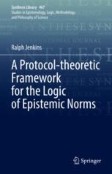Search
Search Results
-
Epistemic Hypocrisy and Standing to Blame
This paper considers the possibility that ‘epistemic hypocrisy’ could be relevant to our blaming practices. It argues that agents who culpably...
-
Epistemic Proceduralism Stated
This chapter formulates the conceptual background of the rest of the book by introducing some of the basic formal machinery, providing a first...
-
Unzip** the zetetic turn
Zetetic norms govern our acts of inquiry. Epistemic norms govern our beliefs and acts of belief formation. Recently, Friedman (2020) has defended...
-
‘Ought’ implies ‘can’ against epistemic deontologism: beyond doxastic involuntarism
According to epistemic deontologism, attributions of epistemic justification are deontic claims about what we ought to believe. One of the most...
-
Group belief reconceived
An influential account or group belief analyzes it as a form of joint commitment by group members. In spite of its popularity, the account faces...
-
Wittgenstein and the Duty to Believe
It is generally assumed that hinge-commitments are deprived of an epistemically normative structure, and yet, that although groundless, the...
-
The Reasons-Responsiveness Account of Doxastic Responsibility and the Basing Relation
In several papers (2013, 2014, 2015) Conor McHugh defends the influential view that doxastic responsibility, viz. our responsibility for our beliefs,...
-
Epistemic Reasons Are Not Normative Reasons for Belief
In this paper, I argue against the view that epistemic reasons are normative reasons for belief. I begin by responding to some of the most widespread...
-
Perceptual justification and the demands of effective agency
Pragmatist responses to skepticism about empirical justification have mostly been underwhelming, either presupposing implausible theses like...
-
Liturgical Philosophy of Religion: An Untimely Manifesto about Sincerity, Acceptance, and Hope
This loosely-argued manifesto contains some suggestions regarding what the philosophy of religion might become in the twenty-first century. It was...
-
A new anti-expertise dilemma
Instability occurs when the very fact of choosing one particular possible option rather than another affects the expected values of those possible...
-
The Type-B Moral Error Theory
I introduce a new version of Moral Error Theory, which I call Type-B Moral Error Theory. According to a Type-B theorist there are no facts of the...
-
Commitment, Norm-Governedness and Guidance
A number of philosophers have argued that there is a basic problem in the no-guidance argument against content normativism. The problem is that the...
-
Belief and credence: why the attitude-type matters
In this paper, I argue that the relationship between belief and credence is a central question in epistemology. This is because the belief-credence...
-
Choosing and refusing: doxastic voluntarism and folk psychology
A standard view in contemporary philosophy is that belief is involuntary, either as a matter of conceptual necessity or as a contingent fact of human...

-
Mind-Brain Dichotomy, Mental Disorder, and Theory of Mind
The tendency to draw mind-brain dichotomies and evaluate mental disorders dualistically arises in both laypeople and mental health professionals,...

-
Moral and Factual Ignorance: a Quality of Will Parity
Within debates concerning responsibility for ignorance the distinction between moral and factual ignorance is often treated as crucial. Many...
-
Why Reid was no dogmatist
According to dogmatism, a perceptual experience with p as its content is always a (defeasible) source of justification for the belief that p. Thomas...
-
Deontological evidentialism and ought implies can
Deontological evidentialism is the claim that S ought to form or maintain S’s beliefs in accordance with S’s evidence. A promising argument for this...
